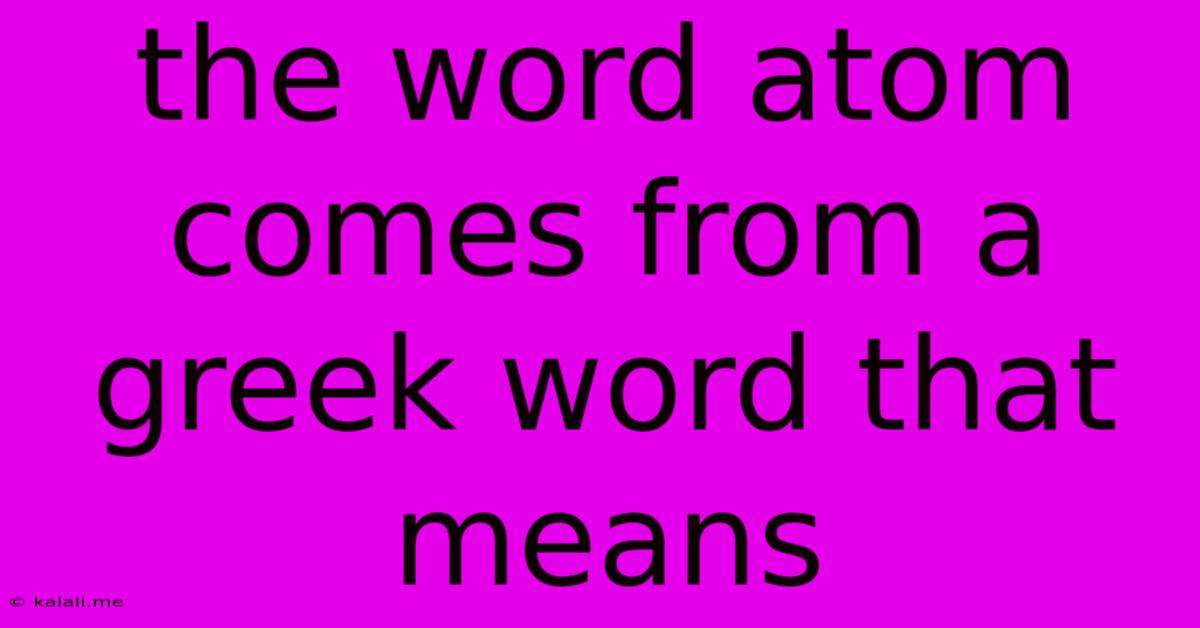The Word Atom Comes From A Greek Word That Means
Kalali
Jun 16, 2025 · 2 min read

Table of Contents
The Word "Atom" Comes From a Greek Word That Means... Uncuttable!
The word "atom," a cornerstone of modern science, has its roots deep in ancient Greece. Understanding its etymology reveals a fascinating journey from philosophical speculation to the rigorously tested theories of modern physics. This article explores the origin of the word "atom" and its connection to the ancient Greek concept of indivisible particles.
The word "atom" originates from the Ancient Greek word ἄτομος (atomos). This word is a compound of two smaller words:
- ἀ- (a-): meaning "not" or "without"
- τέμνω (temnō): meaning "to cut" or "to sever"
Therefore, ἄτομος (atomos) literally translates to "uncuttable," "indivisible," or "unsplittable."
Ancient Greek Philosophers and the Atomos
The concept of the atomos wasn't merely a linguistic curiosity; it formed the basis of a significant philosophical school of thought. Pre-Socratic philosophers, notably Leucippus and Democritus (around the 5th century BC), proposed that all matter was composed of these fundamental, indivisible particles. They envisioned these atomoi as eternally existing, solid, and indestructible building blocks of reality, differing only in shape, size, and arrangement. This atomic theory contrasted with other prevalent philosophical views that posited fundamental substances like water or air as the foundation of everything.
This ancient Greek conception of the atomos was purely philosophical, lacking the experimental basis that defines modern science. However, the idea persisted, influencing later scientific thought for centuries. Even though there wasn't experimental evidence at the time, the concept of indivisible particles offered a logical explanation for the observable changes in matter – how substances could transform and combine but never truly disappear.
From Ancient Philosophy to Modern Science
The word "atom" and the underlying concept remained largely dormant for centuries until the scientific revolution. By the 17th and 18th centuries, renewed interest in atomism emerged, fuelled by advances in chemistry and physics. Scientists like John Dalton, building on earlier work, revived and refined the atomic theory, providing empirical evidence to support the existence of atoms as fundamental particles. Dalton's atomic theory, proposed in the early 19th century, posited that elements consist of indivisible atoms, all atoms of a given element are identical, and chemical reactions involve the rearrangement of atoms.
Of course, the story didn't end there. The 20th century brought about the discovery of subatomic particles – protons, neutrons, and electrons – shattering the ancient Greek notion of the absolutely indivisible atom. Yet, the term "atom" persists, albeit with a modified meaning. We now understand that atoms are not truly uncuttable, but they remain the fundamental building blocks of chemical elements and the smallest units of matter that retain the chemical properties of an element.
The journey of the word "atom" from its ancient Greek roots to its modern scientific usage highlights the enduring power of ideas and the iterative nature of scientific progress. While the original meaning of "uncuttable" is no longer strictly accurate, it serves as a testament to the remarkable insights of ancient philosophers and the remarkable evolution of our understanding of the universe.
Latest Posts
Latest Posts
-
How To Create Clickable Image In Html
Jun 16, 2025
-
What Are The Factors Of 121
Jun 16, 2025
-
What Is A Theme Of The Passage
Jun 16, 2025
-
A Company That Provides Access To The Internet
Jun 16, 2025
-
Which Word Is Closest In Meaning To The Underlined Word
Jun 16, 2025
Related Post
Thank you for visiting our website which covers about The Word Atom Comes From A Greek Word That Means . We hope the information provided has been useful to you. Feel free to contact us if you have any questions or need further assistance. See you next time and don't miss to bookmark.